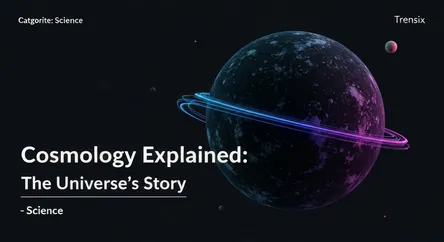Science
Cosmology Explained: The Universe's Story

Explore cosmology, the science of the universe's origin, evolution, and ultimate fate. Learn about the Big Bang, dark matter, and cosmic mysteries.
What is it?
Cosmology is the scientific study of the origin, evolution, and eventual fate of the universe. It's a grand-scale science that seeks to understand everything from the initial moments after the Big Bang to the large-scale structures we see today, like galaxies and galaxy clusters. Cosmologists use physics and astronomy to create models that explain observations such as the expansion of the universe, the cosmic microwave background radiation (an afterglow from the Big Bang), and the abundance of different elements. Key areas of focus include understanding the roles of dark matter and dark energy, mysterious components that appear to dominate the cosmos.
Why is it trending?
Cosmology is trending thanks to groundbreaking discoveries from advanced telescopes like the James Webb Space Telescope (JWST) and the Hubble Space Telescope. These instruments are providing unprecedented views into the early universe, challenging existing models and fueling public fascination. The ongoing mysteries of dark matter and dark energy also keep cosmology in the spotlight, as scientists around the world race to detect and understand these invisible forces that are shaping the destiny of our universe, generating significant media and scientific interest.
How does it affect people?
While cosmology doesn't directly impact daily routines, it addresses some of humanity's most profound questions: Where did we come from? What is our place in the cosmos? This pursuit of knowledge drives technological innovation in areas like optics, computing, and sensor technology. Furthermore, understanding the vastness and history of the universe can offer perspective, inspire awe, and influence philosophy, art, and culture. It shapes our collective worldview and fuels our innate curiosity about the magnificent and mysterious reality we inhabit.